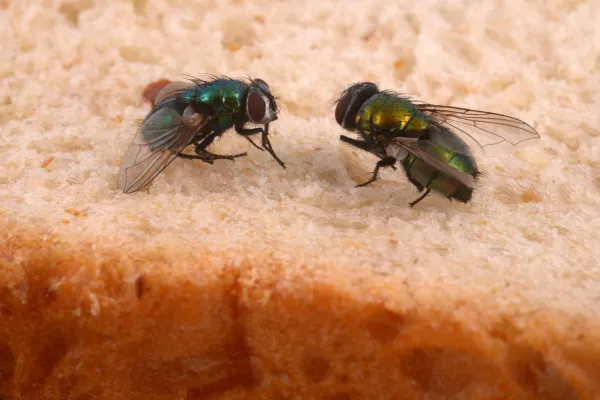
BLOGS
BLOG

Why Flies Are More Than Just Annoying: The Health Risks They Pose
Flies might seem like nothing more than a nuisance buzzing around your house, but did you know they can actually pose serious health risks? Whether it's the common housefly, fruit flies, or even the pesky drain fly, these insects can carry harmful bacteria, viruses, and other pathogens that threaten the cleanliness of your home and the health of your family.
In this blog post, we'll dive into the health risks posed by flies and offer expert advice on how to keep your home fly-free, with a little help from Valley Wide Pest Control.
The Unseen Dangers of Flies
Flies are more than just irritating pests that disrupt your peace. These small creatures can carry dangerous bacteria that thrive in the unsanitary environments where flies typically live, such as garbage dumps, animal feces, and sewage systems. When they land on your food or countertops, they bring these harmful bacteria with them, potentially contaminating your meals and creating an environment ripe for illness.
1. Bacteria and Disease Transmission
Flies are excellent at spreading diseases. Studies have shown that flies can pick up pathogens from their environment and transfer them to human food, surfaces, and utensils. Some of the diseases they can transmit include:
Salmonella – Responsible for food poisoning, salmonella can cause severe stomach cramps, diarrhea, and fever. Flies that feed on raw meat, feces, or spoiled food can easily carry this bacteria.
E. Coli – This bacteria can cause foodborne illnesses, leading to symptoms like stomach cramps, diarrhea, and vomiting. In extreme cases, it can lead to kidney failure or even death.
Campylobacter – Another cause of food poisoning, campylobacter can be spread by flies that land on contaminated food. Symptoms include fever, diarrhea, and abdominal pain.
Cholera – This dangerous disease can be transmitted by flies that feed on contaminated water. Symptoms include severe diarrhea, vomiting, and dehydration.
Typhoid fever – Flies are also known to carry the bacteria responsible for typhoid fever. This serious illness causes fever, stomach pain, and a loss of appetite, and can be fatal if left untreated.
2. Parasite Spread
Flies don’t just carry bacteria; they can also spread parasitic infections. For example, flies that feed on animal waste or decaying organic matter can carry parasitic larvae like tapeworms, which can affect both pets and humans. When flies land on food or kitchen surfaces, they can transfer these parasites to your meals, putting your family at risk.
3. Allergens and Respiratory Issues
Some flies, like houseflies, also bring along microscopic allergens. These allergens can cause asthma attacks, allergies, and other respiratory problems, especially in children and those with pre-existing health conditions. The more flies there are, the higher the concentration of allergens in your home, making it difficult to maintain clean and healthy air.
How to Prevent Flies in Your Home
Now that you understand the risks flies bring, it’s time to take action. Here are some practical steps you can take to keep your home fly-free and reduce the risk of health problems:
1. Seal Off Entry Points
Flies are opportunistic, finding their way into homes through open doors, windows, or cracks in the walls. To prevent them from entering, make sure all windows and doors are properly sealed, and install or repair screens where necessary. Tighten any gaps around windows or doors, and ensure that there are no cracks in your home’s exterior.
2. Cleanliness is Key
Flies are attracted to food waste, so keeping your home clean is one of the best ways to discourage them from hanging around. Make sure to:
Take out the trash regularly. Don’t let trash sit around for long periods, as it becomes a breeding ground for flies.
Clean food spills immediately. Flies are attracted to even the tiniest crumbs or spilled liquids, so wiping them up quickly can help prevent an infestation.
Store food in sealed containers. Avoid leaving fruits, vegetables, or open containers of food exposed, as they can attract flies in no time.
3. Use Fly Traps and Repellents
Fly traps, both DIY and store-bought, can help reduce fly populations. For example, you can create a simple fly trap using a jar filled with apple cider vinegar and a few drops of dish soap. Alternatively, sticky fly paper can be hung in areas where flies are most active, like the kitchen or dining room.
Essential oils like eucalyptus, lavender, or peppermint can also repel flies naturally. You can diffuse these oils around the home or mix them with water to create a spray.
4. Professional Pest Control
Sometimes, despite your best efforts, flies can still find their way into your home. If you're facing an ongoing fly problem that you just can't seem to get under control, it's time to call in the experts.
Valley Wide Pest Control is here to help. Our experienced team specializes in the removal and prevention of fly infestations. We use a combination of safe and effective methods to identify where flies are breeding in your home and eliminate them at the source. Whether you're dealing with fruit flies, houseflies, or even drain flies, we can handle it.
How Valley Wide Pest Control Can Help
At Valley Wide Pest Control, we understand that flies can be more than just a nuisance; they can pose significant health risks to you and your family. That’s why we offer comprehensive fly control services to keep your home safe and pest-free. Here’s how we can help:
Inspection and Identification – Our experts will inspect your home to identify the types of flies present and the sources of the infestation.
Targeted Treatment – We offer targeted treatments to eliminate flies in your home, including environmentally-friendly options that are safe for your family and pets.
Prevention Strategies – Beyond elimination, we’ll help you implement long-term prevention strategies, such as sealing entry points and recommending the best fly traps and repellents for your home.
Ongoing Support – If the fly problem persists, we offer follow-up visits to ensure that your home stays fly-free.
Conclusion
Flies are more than just a nuisance; they can carry harmful bacteria and diseases that pose serious health risks. Keeping your home clean, sealing entry points, and using fly traps are all great ways to reduce the risk of an infestation. However, for more persistent problems, professional pest control services are your best bet.
Valley Wide Pest Control has the knowledge, experience, and tools to help keep your home fly-free and protect your family from the health risks these pests bring. Don’t wait for the problem to worsen—contact us today and let us help you enjoy a healthier, more comfortable home.
With the right steps and expert help, you can take control of your home and keep flies at bay for good!
© 2024 Valley Wide Pest Control. All rights reserved.

